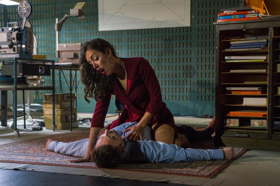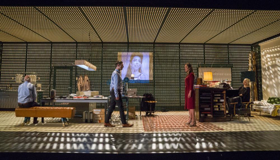Review: Van Hove's Take on Janacek's DIARY at BAM Is Audacious - But Not in a Good Way

Photo: Richard Termine
"Audacious" can mean daring--and Belgian director Ivo van Hove certainly fits that description for his approaches to Arthur Miller's A VIEW FROM THE BRIDGE and THE CRUCIBLE and numerous other theatre pieces.
But when it came to Leos Janacek's DIARY OF ONE WHO DISAPPEARED, which played three performances at BAM last week after appearing at many other world venues, van Hove's work (with the Dutch company, Muziektheater Transparent) might take on another of the word's meanings: presumptuous and arrogant, perhaps, even disrespectful.
Despite some lovely performances, from mezzo Marie Hamard, as the liveliest "ghost" around, and pianist Lada Valesova in particular (and to a lesser degree, tenor Andrew Dickinson), it's hard to imagine what van Hove thought he was accomplishing by expanding Janacek's original score into something between opera and theatre. In any case, I don't believe it succeeded in most ways.

Hamard, Lada Valesova. Photo: Richard Termine
It's true that the song cycle is not often performed in its original form--for tenor, alto/mezzo, a three-female-voice chorus and piano--but it nonetheless has a compelling, urgent quality to it. (See Ian Bostridge's recording on Warner Classics, along with some other versions, which can be found on YouTube.) DIARY's style sets it apart from most works one hears in lieder recitals by telling its love story with more than a single character with (most frequently) piano accompaniment, which might also explain its limited performance history (or lack thereof).
I found it puzzling to see what van Hove did with the piece, although he gave at least a hint of his intentions in an article in The New York Times last month. In it, he admitted that he hasn't done anything "quite like this [music piece] before...." He added, "You have to invent more. An opera composer is thinking about staging, but with this you have to create a theatrical world. [My italics] It's bringing alive something that was just going to stand there and sing."
Considering that Janacek is one of the great opera composers of the 20th century--who, indeed, knew a thing or two about drama--it would be surprising enough for the director to feel that he had to bring a piece like this "to life." (That's not to say that a director cannot add greatly to a work's success, but that one might also detract from it.)
But he also seems to be ignoring the ability of singers who specialize in this type of art song to project the drama that the composer has written into the score--which makes van Hove's insistence on bringing his second-rate coals to Newcastle with this dramatization seem particularly galling.
The director worked with dramaturg Krystian Lada and composer Annelies van Parys to superimpose Janacek's own obsession with a young woman (Kamila Stosslova) many years his junior, as expressed in some 700 letters, onto his song cycle.
The work was inspired by a series of poems about a village boy who falls in love with a gypsy, published in a Czech newspaper in 1916 and the composer clearly thought of his own deep feelings about the dark-haired Stosslova in bringing the poems to musical life.
Here, the piece is set in a photographer's studio, set and design by Jan Versweyveld, with an older actor (Wim van der Grijn, dressed by designer An D'Huys to resemble the protagonist). In the end, the actor--a stand-in for the composer--burns papers and tells that a portion of the royalties from DIARY will go to Stosslova.
In that Times interview previously mentioned, van Hove said, "If you are not deeply interested in music, stay away from it as a director, because there has always been a director there before you: the composer." In showing his desire to be the smartest person in the room, van Hove only proved that he is just another of those theatre directors who think they have something to bring to the world of music...and don't.
Reader Reviews
Videos

